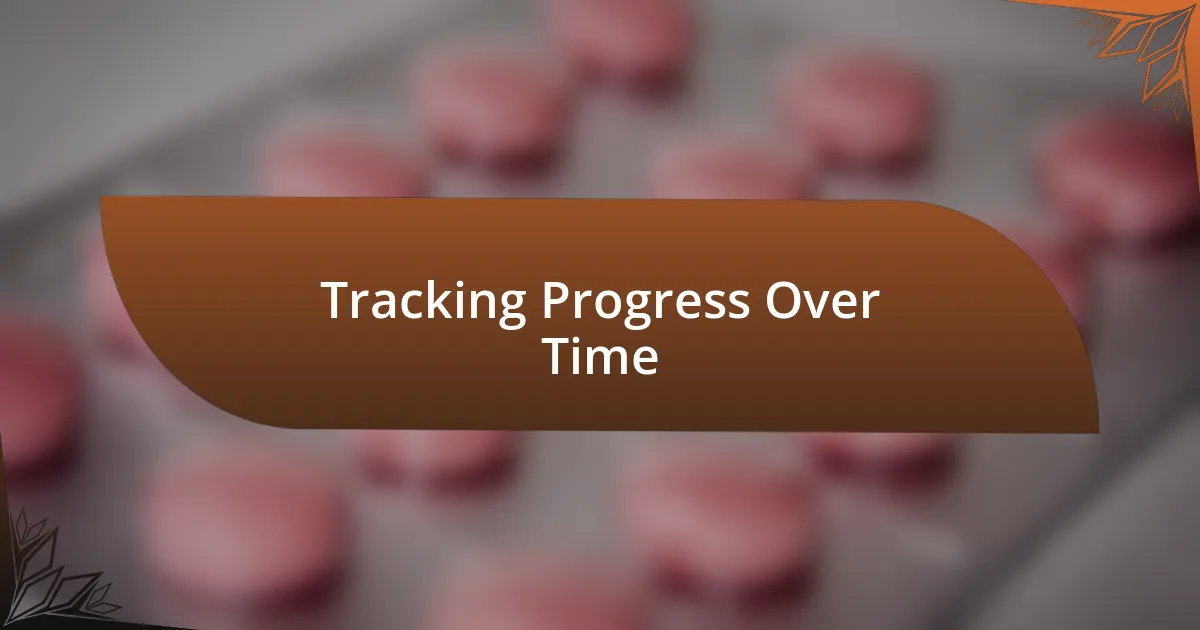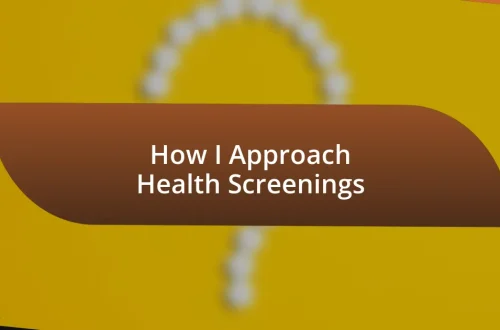
How I Personalize My Health Assessments
Key takeaways:
- Health assessments are comprehensive, focusing on physical, mental, and social factors that affect overall wellness.
- Setting specific, measurable personal health goals enhances motivation and accountability, allowing for meaningful progress.
- Choosing the right assessment tools and customizing questions improves understanding and engagement in one’s health journey.
- Regularly interpreting results and creating an adaptable action plan helps maintain focus on health goals and encourages continuous improvement.

Understanding Health Assessment Basics
Health assessments are more than just a routine check-up; they provide a snapshot of overall wellness. I remember the first time I really grasped this concept during a physical exam. The doctor explained how vital signs, lab results, and even my lifestyle choices paint a complete picture of my health. It made me realize that every number and detail is a piece of my health puzzle.
When I first learned about the different components of a health assessment, I was surprised at how comprehensive they truly are. It isn’t just about weight or blood pressure; it includes mental health, nutrition, and even social factors. Have you ever considered how your stress levels or sleep patterns can influence your physical health? I often overlook these aspects, but they significantly impact my well-being.
Engaging with my health assessments has transformed how I view my personal health journey. For me, each assessment feels like a friendly checkpoint, allowing me to reflect on my habits and make necessary changes. I think it’s fascinating how our assessments can guide us toward better choices. What steps do you take to personalize your health journey? Over time, I’ve learned that understanding these basics helps me prioritize the areas in my life that need attention.

Setting Personal Health Goals
Setting personal health goals is crucial for making meaningful progress in my wellness journey. I often think of my health goals as a roadmap that guides my daily decisions and long-term aspirations. Recently, I set a goal to improve my cardiovascular fitness by integrating running into my routine. The first time I completed a 5K, I felt an overwhelming sense of accomplishment. It wasn’t just about the distance; it was about the dedication and commitment I made to achieve something that once seemed daunting.
I’ve learned that setting specific and measurable goals, like the 5K, keeps me motivated. I remember when I wrote down my target time and shared it with friends for accountability. Including them in my journey added a layer of enjoyment and support—and, honestly, it made a huge difference. This collaborative approach also provided me with new insights and ideas, such as varying my workout styles or trying group classes to maintain engagement. What strategies work for you in setting goals? My experience has shown me that sharing goals not only enriches the process but also fortifies commitment.
Another important aspect is regularly reviewing and adjusting my health goals. Life’s unpredictability can throw my initial plans off course. For example, when I experienced a minor injury last year, I had to rethink my fitness goals entirely. It was a humbling moment, but I adapted by focusing on strength training instead. This shift not only kept me active but also broadened my understanding of my body’s needs. Flexibility in my goal-setting approach has enabled me to remain resilient and optimistic about my health journey.
| Goal Type | Description |
|---|---|
| Short-term Goals | These goals are achievable within a few weeks or months, such as improving daily step count. |
| Long-term Goals | These involve continuous progress over many months or years, like completing a marathon or weight loss milestones. |
| SMART Goals | Specific, Measurable, Achievable, Relevant, Time-bound; this framework ensures clarity in setting goals. |

Choosing Relevant Assessment Tools
Choosing the right assessment tools is a pivotal step in personalizing my health journey. I often find that the right tools not only enhance my understanding but also motivate me to strive for improvement. For example, when I first started tracking my nutrition, I used a popular app that allowed me to log foods quickly. Surprisingly, gaining insights into my daily habits illuminated areas where I could improve, like my water intake, which I’d previously underestimated.
Here are some key factors that guide me in selecting assessment tools:
- Usability: I need tools that seamlessly fit into my routine, so I prefer those with user-friendly interfaces and easy navigation.
- Customization: Tools should allow me to tailor my input—like setting my own benchmarks or tracking specific metrics.
- Feedback Mechanism: Choosing tools that provide instant feedback helps me stay accountable. I remember how a simple weekly progress report from an app reignited my motivation.
- Community Support: Some platforms offer community forums where users can share experiences—I’ve found this element incredibly encouraging when navigating challenges.
In my experience, integrating the right assessment tools has been transformative. It’s remarkable how the right technology can bridge gaps in understanding and spur progress.

Customizing Assessment Questions
To truly personalize my health assessments, customizing the questions I answer is essential. I often ask myself what specific areas I want to explore more deeply, such as my sleep patterns or stress levels. By framing questions that address my unique experiences—like “How did I feel after that workout?”—I can gain valuable insights tailored to my daily life.
I remember a time when generic questionnaires felt impersonal, leading me to overlook crucial aspects of my well-being. So, I started to adjust questions to reflect my routines and challenges. For instance, instead of asking about overall energy levels, I now inquire about my energy dips, which has been a game-changer in identifying triggers for fatigue. This targeted approach allows me to connect the dots and understand the cause-and-effect relationships in my health.
Furthermore, I find it rewarding to employ open-ended questions. Asking myself, “What motivated me to eat healthier this week?” not only prompts reflection but also encourages me to celebrate small wins. This practice of customization transforms my health assessments into a meaningful dialogue with myself, keeping me engaged and focused on my wellness goals.

Interpreting Assessment Results
Interpreting assessment results is often the moment of truth in my health journey. When I first started looking at my data, I felt overwhelmed by numbers and percentages. Yet, over time, I learned to break down each result into actionable insights, like reflecting on what specific patterns emerged during weeks when I adhered closely to my health goals. Isn’t it fascinating how a simple number can reveal so much about my lifestyle choices?
Sometimes, I sit down with my assessment results and ask myself how they resonate with my daily experiences. For instance, if my sleep quality metric drops, it prompts me to think back to any late-night screen time or stressful events. Those reflections help me connect the dots, reminding me that my mind and body are deeply intertwined, which sometimes feels like a revelation.
I also find it helpful to keep a journal alongside my assessments. When interpreting my results, writing about my feelings—say, after noticing a decline in my mood metrics—not only clarifies my emotions but motivates me to seek solutions. Have you ever felt that urge to address something in your life when you see it laid out in front of you? That desire for positive change is precisely what drives me to take my health assessments seriously, turning raw data into personal empowerment.

Creating an Action Plan
Creating an action plan starts with setting realistic and measurable goals based on my assessment results. For example, after noticing I wasn’t drinking enough water, I chose to aim for eight glasses a day. It felt like a small change, but tracking it turned into a rewarding habit. Have you ever realized how tiny adjustments can snowball into significant improvements over time?
I also prioritize brainstorming strategies that fit my lifestyle. One time, I identified that fitness was becoming mundane. To combat this, I decided to explore new activities, like joining a dance class, infusing both fun and movement into my routine. What strategies have you thought about to keep things engaging in your health journey?
Lastly, I make it a point to review my action plan regularly. Life can change quickly, and what worked last month may not be applicable now. Noticing that I was less motivated during colder months, I adapted my plan to include indoor workouts. It’s liberating to adjust my approach and reminds me that my health is a dynamic process. How often do you reassess your plans to stay on track?

Tracking Progress Over Time
Tracking my progress over time has been a game-changer in my health journey. I keep a simple journal to note daily habits and feelings, which allows me to see the patterns that emerge. For instance, after a few weeks of tracking, I discovered that my mood improved on days when I prioritized exercise. Have you ever noticed how some activities make you feel more energized than others?
I also utilize apps to visually chart my habits. When I first started, I was surprised to see that tracking my sleep patterns revealed I wasn’t getting enough rest. By adjusting my bedtime, I not only slept better but my productivity soared during the day. Isn’t it fascinating how seemingly small changes can have a ripple effect on various aspects of our lives?
As I reflect on my progress, I make it a point to celebrate small victories. When I achieved my goal of staying adequately hydrated for a month, I treated myself to a new water bottle that motivated me to continue. It’s essential to acknowledge these milestones, as they fuel my commitment. Have you considered treating yourself for the hard work you put in along the way?



